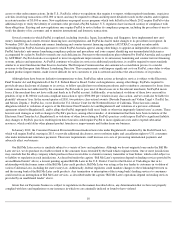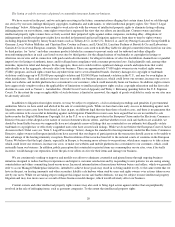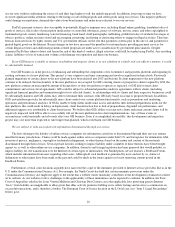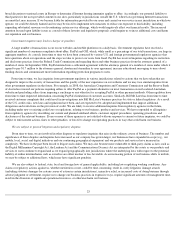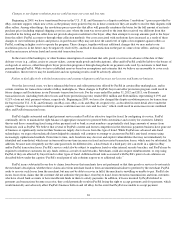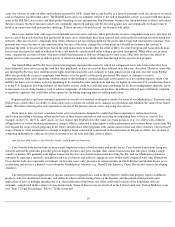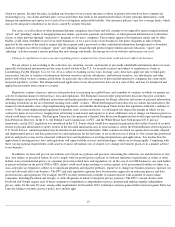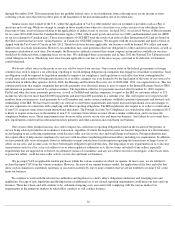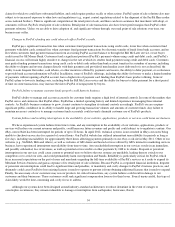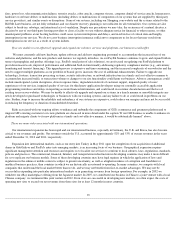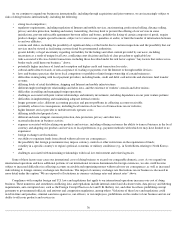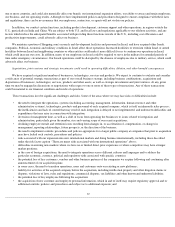eBay 2012 Annual Report Download - page 30
Download and view the complete annual report
Please find page 30 of the 2012 eBay annual report below. You can navigate through the pages in the report by either clicking on the pages listed below, or by using the keyword search tool below to find specific information within the annual report.
Certain of our businesses, including GSI's interactive marketing services business, utilize “behavioral marketing” (generally, the tracking
of a user's online activities) to deliver relevant content to Internet users. The FTC has released a Staff Report with principles to address consumer
privacy issues that may arise from behavioral marketing and to encourage industry self-regulation. In March 2012, the FTC issued a final report
titled “Protecting Consumer Privacy in an Era of Rapid Change: Recommendations for Businesses and Policymakers,” which details the FTC's
perspective on best practices for companies that collect and use consumer data to protect the privacy of consumers. Should the FTC pursue
enforcement actions related to these business practices, we may have to modify our business practices to conform and incur substantial costs,
which could harm our business. In addition, legislators and regulators in various jurisdictions are increasingly focusing on the capture and use of
location-
based information relating to users of smartphones and other mobile devices, which may result in additional restrictions being placed on
the collection and use of such information. Any such regulations or legislation could, if enacted, prohibit the use of certain technologies,
including those that track individuals' activities on the Internet or geolocation via mobile devices. Such laws and regulations could restrict our
ability to collect and use page viewing data and personal information, which may reduce demand for our services or require changes to our
current business models, such as advertising, which could harm our business.
Even technical violations of certain privacy-related laws can result in significant penalties, including statutory damages. The Federal
Communications Commission recently amended its regulations under the Telephone Consumer Protection Act (TCPA), effective in July 2012,
which could increase our exposure to liability for certain types of telephonic communication with customers, including but not limited to text
messages to mobile phones. Under the TCPA, plaintiffs may seek actual monetary loss or statutory damages of $500 per violation, whichever is
greater, and courts may treble the damage award for willful or knowing violations. Two putative class-action lawsuits have been filed containing
allegations that our businesses violated the TCPA. Roberts v. PayPal (filed in the U.S. District Court for the Northern District of California in
February 2012) contains allegations that commercial advertisements for PayPal products and services were sent via text message to mobile
phones without prior consent. Murray v. Bill Me Later (filed in the U.S. District Court for the Northern District of Illinois in June 2012) contains
allegations that Bill Me Later made calls featuring artificial or prerecorded voices without prior consent. These lawsuits seek damages (including
statutory damages) and injunctive relief, among other remedies. Given the enormous number of communications we send to our users, a
determination that there have been violations of laws relating to PayPal's or Bill Me Later's practices (or those of any of our other companies)
under the TCPA or other communications-based statutes could expose us to significant damage awards that could, individually or in the
aggregate, materially harm our business.
Data collection, privacy and security have become the subject of increasing public concern. If Internet and mobile users were to reduce
their use of our websites, mobile platforms, products and services as a result, our business could be harmed. As noted above, we are also subject
to the possibility of security breaches, which themselves may result in a violation of these laws.
Our revenue from advertising is subject to factors beyond our control.
We derive significant revenue from advertising on our websites and applications. Revenues from online advertising are sensitive to events
and trends that affect advertising expenditures, such as general changes in the economy and changes in consumer spending, the effectiveness of
online advertising versus offline advertising media and the value our websites provide to advertisers relative to other websites. Similarly, the
economic downturn adversely impacted our advertising revenue. In addition, major search engine operators (e.g., Google) have the ability to
change from time to time, at their sole discretion, the rules and search algorithms governing the pricing, availability and placement of online
advertising, and do so periodically. Changes by Google since October 2012 have significantly reduced the amount of traffic our Marketplaces
unit receives from free search on Google. Any changes in these rules or search algorithms could materially reduce the value that we derive from
online advertising on our websites, either directly or indirectly. For example, retailers pay a fee to Shopping.com for online shoppers directed to
their websites by our Shopping.com website. Rule changes made by search engines beginning in 2008 disrupted traffic to our Shopping.com
website, which in turn adversely affected click-through traffic to retailers from our Shopping.com website and associated fee revenue. In
addition, legislators and regulators in various jurisdictions, including the U.S. and the European Union, are reviewing Internet advertising
models and the use of user-related data, including location-based information relating to users of smartphones and other mobile devices, and are
considering proposals that could restrict or otherwise impact these business models and practices. If we experience a reduction in our advertising
revenues due to economic, competitive, regulatory, technological or other factors, the renegotiation of our contracts with major advertising
companies on unfavorable terms, or a reduction in our ability to effectively place advertisements on our sites, or are otherwise unable to provide
value to our advertisers, our business and financial results would suffer.
28


